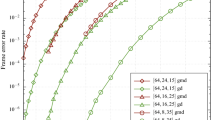Abstract
Several successive decodings of cascaded codes become possible in principle without information loss if the decoding task is extended to determine a posterior probability distribution on the codewords. Kullback principle of cross-entropy minimization is considered as a means of implementing it. Its practical use, however, demands some kind of simplification. We propose to look for the posterior distribution in separable form with respect to the information symbols, which leads to decoding output of same form as its input. As an illustration of these ideas, we considered decoding an iterated product of parity-check codes which results in a vanishingly small error probability provided the channel signal-to-noise ratio is larger than some threshold. Interpreting a single linear code as a kind of product of its parity checks, the same ideas lead to a simple and efficient algorithm.
Preview
Unable to display preview. Download preview PDF.
Similar content being viewed by others
References
G. BATTAIL, Décodage Pondéré des Codes Linéaires, IPMU Symposium, Paris, 30 june–4 july 1986
G. BATTAIL, Le Décodage Pondéré en tant que Procédé de Réévaluation d'une Distribution de Probabilité, Annales des Télécommunications, 42 no 9–10, sept.–oct. 1987
P. ELIAS, Error-free Coding, IRE Trans. IT, jan. 1954, pp. 29–37
G.D. FORNEY Jr, Concatenated Codes, MIT Press, 1966
J.E. SHORE and R.W. JOHNSON, Axiomatic Derivation of the Principle of Maximum Entropy and the Principle of Minimum Cross-Entropy, IEEE Trans. Inf. Th., 26 no 1, jan. 1980, pp. 26–37
S. KULLBACK, Information Theory and Statistics, Wiley, 1959
R.A. SILVERMAN and M. BALSER, Coding for Constant Data Rate Systems — Part I. A New Error-Correcting Code, Proc. IRE, sept. 1954, pp. 1428–1435
G. BATTAIL, J.C. BELFIORE and R. SFEZ, Decoding as a Means of Reestimating a Probability Distribution; Application to an Iterated Product of Parity-Check Codes, submitted to IEEE International Symposium on Information Theory, Kobe, Japan, 17–24 july 1988
G. BATTAIL, M. DECOUVELAERE and P. GODLEWSKI, Replication Decoding, IEEE Trans. Inf. Th., 25 no 3, may 1979, pp. 332–345
N. ABRAMSON, Cascade Decoding of Cyclic Product Codes, IEEE Trans. on Com., COM-16 no 3, june 1968, pp. 398–402
Author information
Authors and Affiliations
Editor information
Rights and permissions
Copyright information
© 1988 Springer-Verlag Berlin Heidelberg
About this paper
Cite this paper
Battail, G., Sfez, R. (1988). Suboptimum decoding using Kullback principle. In: Bouchon, B., Saitta, L., Yager, R.R. (eds) Uncertainty and Intelligent Systems. IPMU 1988. Lecture Notes in Computer Science, vol 313. Springer, Berlin, Heidelberg. https://doi.org/10.1007/3-540-19402-9_61
Download citation
DOI: https://doi.org/10.1007/3-540-19402-9_61
Published:
Publisher Name: Springer, Berlin, Heidelberg
Print ISBN: 978-3-540-19402-6
Online ISBN: 978-3-540-39255-2
eBook Packages: Springer Book Archive




